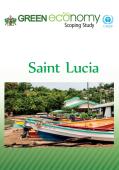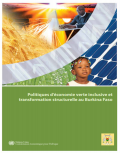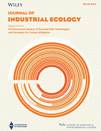
The report Green Economy Scoping Study for Saint Lucia couples an in-depth analysis of Saint Lucia’s agriculture and tourism sectors with a more general review of manufacturing, transport and construction, integrating the key elements of energy, water and waste management.
The study recommends policy reforms that can help speed up the transition to a green economy in Saint Lucia which, like many Small Island Developing States, is disproportionately vulnerable to the impacts of climate change.It also dentifies the most significant challenges for the tourism sector: the high input costs (primarily for energy, water and waste management), competing uses for environmentally sensitive areas accompanied by inadequate land use policies (particularly in coastal areas) as well as the need to diversify Saint Lucian tourism beyond “sun, sea and sand” vacations.
The Low Carbon Society Blueprint for Iskandar Malaysia 2025 presents comprehensive climate change mitigation policies, inlcuding low carbon society actions and sub-actions, and detailed strategies including measures and programs to guide the development of Iskandar Malaysia towards achieving its vision of ‘a strong, sustainable metropolis of international standing’ by 2025.
The Summary for Policymakers offers a concise synopsis of the report, facilitating quick and convenient reference to the Blueprint’s 12 low carbon society actions and the potential carbon emission reductions achievable from the implementation of the actions in Iskandar Malaysia. To provide an effective framework for guiding development in Iskandar Malaysia towards a low carbon society by 2025, the Blueprint adopts the ‘work breakdown structure’ approach that collapses each of the 12 low carbon society actions into sub-actions and, in turn, into measures and detailed programs.
Iskandar Malaysia's Actions for a Low Carbon Future is the first of a series that details 10 of the 281 programmes of the Low Carbon Society Blueprint for Iskandar Malaysia. The report shows how actions supported by science can be used to ensure reduction in carbon emission.
This report describes the 9 programmes being implemented with a special feature on Pasir Guadang, a heavy industry area in the south-eastern region of Iskandar Malysia. Each chapter explains what the programme is all about, its relation to the low carbon society, what the intended outcomes are and the stakeholders that are involved. The book is aims to reach out to a wider audience, sharing what Iskandar Regional Development Authority is working towards in collaboration with other agencies.

In Burkina Faso, more effective macroeconomic management based on policies to promote sustained and sustainable growth remains a priority goal. However, it is now recognized that maintaining rapid growth is not synonymous with structural transformation or a rapid reduction in poverty. To achieve the above-mentioned goals, growth must be deliberately oriented towards sustainable, inclusive development, predicated in particular on a process of agricultural modernization, industrialization tailored to national circumstances and economic diversification which creates jobs, helps to lower poverty levels and gives wider access to basic services. Accordingly, an inclusive green economy, designed in a spirit of structural transformation, is increasingly recommending itself in policy and strategy debates as the most suitable way of bringing about sustainable economic and social transformation.

Reductions in the greenhouse gas (GHG) intensity of passenger and freight transportation are possible through adoption of fuel-saving technologies, demand switching between modes, and large-scale electrification of fleets, in addition to other actions. In this study, future scenarios to 2030 and 2050 are the basis for assessment of GHG reduction potentials for major passenger and freight modes (automobiles, buses, trains, aircraft, and oceangoing vessels) across eight regions of the world. New fuel-saving technologies can significantly reduce the life-cycle GHG footprint of both passenger and freight vehicles, but not uniformly worldwide. Countries outside of the Organization for Economic Cooperation and Development (OECD) lag behind OECD countries in GHG reduction potentials for all modes but oceangoing vessels owing to a combination of slower adoption of fuel-saving technologies and a slower decarbonization of electricity generation and other processes. The reduction of GHG intensity will occur more slowly for freight modes than for passenger modes.
